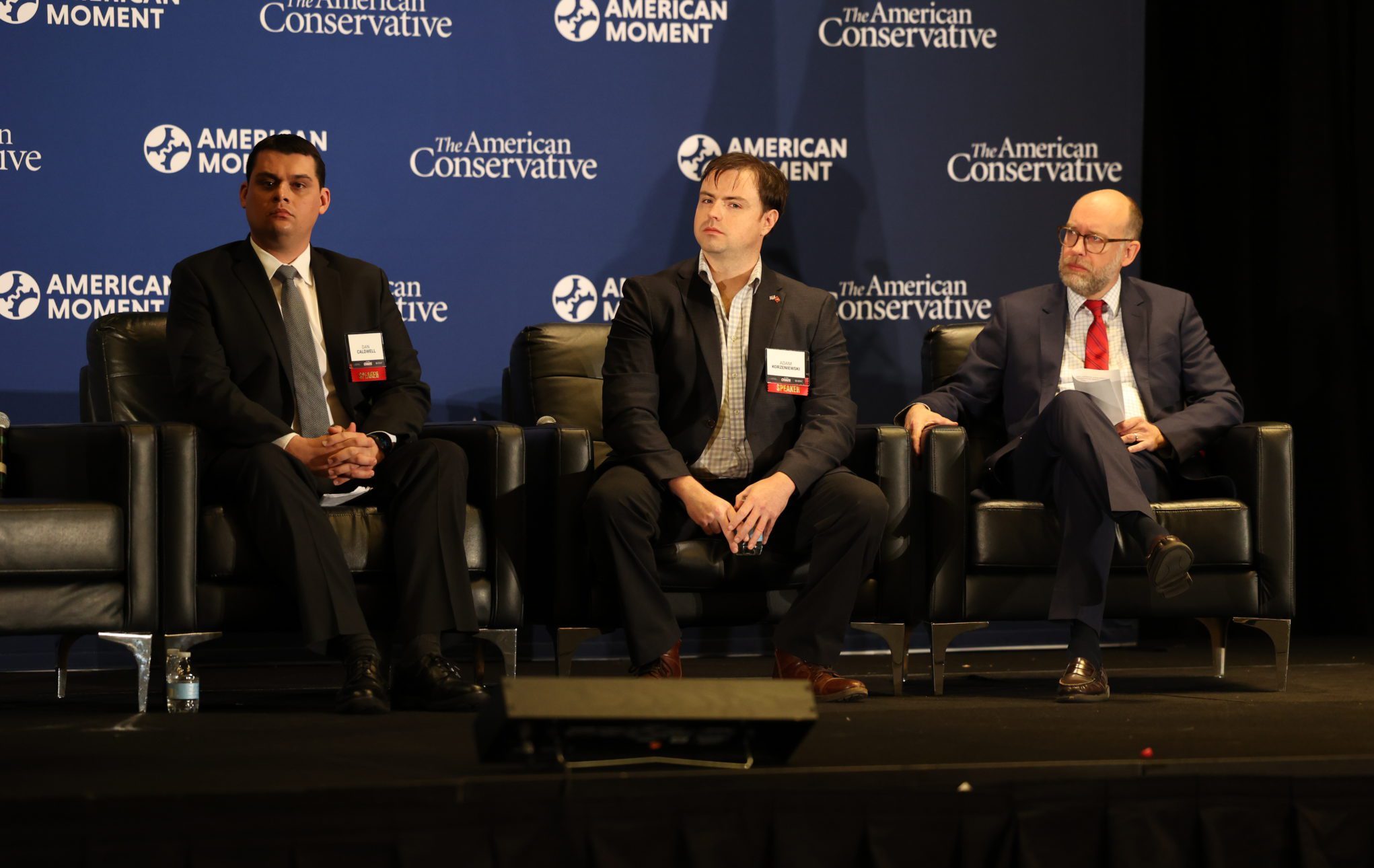Why Hawks Fear the Restraint Coalition

The interventionist uniparty is afraid—very afraid. Afraid enough, in fact, to sling oodles of mud at a rising national coalition for foreign-policy restraint.
This new restraint coalition encompasses three camps: the broad New Right (including political Catholics, national conservatives, Claremont folks, and some Trumpy populists); libertarians and old-school realists (who’ve long bandwagoned together); and what might be called the traditional left (the likes of Glenn Greenwald, Michael Tracey, and my Compact colleague Edwin Aponte). The three camps came together for TAC’s “Up From Chaos” snap conference in Washington last month, and to sign Compact’s recent statement calling for de-escalation over Ukraine.
These camps disagree about a lot of issues, of course; in domestic policy, the libertarians are especially at odds with the other two, which increasingly coalesce over the need to save representative government from the predations of private, corporate power—or, to put it another way, to democratize the economy. Yet the American system generously rewards precisely such alliance-building around discrete issues. In this case, three groups are joining forces, as yet often loosely and unofficially, to give voice to the millions of Americans who drew the right conclusions from the last 20 years’ bloody and wasteful exercises in imperial expansion, who now seek a more realistic, less ideological posture abroad.
Such an alliance could have potentially wide ramifications in U.S. politics, especially if it is institutionalized to a greater extent than it is today. Which is why, I suspect, the bipartisan hawks are working double-time to smear the coalition as unpatriotic, pro-Putin, and worse.
Witness Monday’s Wall Street Journal op-ed by Jeffrey Scott Shapiro, in which the former Trump administration apparatchik accused the restraint coalition of falling for the “Russia temptation,” as the headline put it. In the piece, Shapiro fretted that too many populist conservatives had fallen for “Russian propaganda” and bought into “Putin’s narrative.” But while the piece was heavily weighted with conclusory statements, it was light on actual evidence of restrainers succumbing to the “Russia temptation”—rather than calling for less ideology and more caution in response to Russia’s invasion of Ukraine, which is something else entirely.
Shapiro cited an online discussion group where some of his former Trump administration colleagues allegedly traded pro-Putin sentiments in the immediate aftermath of the invasion. Yet Shapiro didn’t name names, making it impossible to substantiate what amounts to chatroom gossip. Beyond that, he came up mostly empty-handed.
Shapiro dinged Washington state congressional candidate Joe Kent for treating Putin’s negotiating demands as a “decent starting point,” which is effectively what the Kiev government is doing. Shapiro also assailed TAC’s Helen Andrews for saying, “Ukraine is a corrupt country”—which is a statement of fact, reflected in Ukraine’s abysmal Transparency International rankings as well as countless State Department reports and New York Times editorials lamenting Ukrainian graft. Is acknowledging inconvenient realities now a pro-Putin act?
Finally, Shapiro criticized the Compact declaration for calling for “‘de-escalation’ and ‘good-faith peace talks’” and for demanding that President Biden renounce regime change in Moscow. But how is any of this “alarming,” as Shapiro insists? The politicians and writers Shapiro criticizes have, contra his assertion, all denounced Russian aggression. What Shapiro seems to want, but can’t bring himself to say outright, is escalation and regime change. So, instead, he frames opposition to such dangerous policies as “extreme isolationism” and Putinism, all in an attempt to erect a cordon sanitaire around foreign-policy realism.
An even more mendacious—indeed, downright vile—attack was mounted last week against Dan Caldwell, a vice president at the Koch-affiliated group Stand Together, which advocates foreign-policy restraint from a libertarian perspective. Judd Legum, a former Center for American Progress and Hillary Clinton campaign staffer, published an email sent by Caldwell to the Stand Together staff and claimed that Caldwell had called for “a partial ‘victory’ for Russia.”
Yet as Reason’s Robby Soave noted, “nowhere in his article does Legum share the email in its entirety: Instead, he selectively quotes from it, leaving out important, clarifying context.” Indeed. There is selective quoting—and then there is Judd Legum-style selective quoting. Far from making a merely boilerplate condemnation of the invasion, as Legum claimed, Caldwell had written, “Russia’s invasion of Ukraine is immoral, unjustified, and should be immediately halted. In addition, the regime of Vladimir Putin is authoritarian and has inhibited the Russian people from enjoying the benefits of a free and open society.”
As for the “victory” bit quoted by Legum, he really only quoted the single word, victory, and added his own verbiage to make it seem as if Caldwell had called for a partial Russian win. Here’s what Caldwell had actually written to the Stand Together staff: “An outright victory by either Russia or Ukraine is increasingly unlikely, and a diplomatic resolution is the path that best limits the bloodshed and minimizes the risk that the current war could escalate into a larger conflict.” Now, you might agree or disagree with Caldwell on this analysis—I happen to think he’s dead-right—but only an idiot or a malicious hack could interpret these words as support for a “partial Russian ‘victory.’”
Legum also blasted Caldwell for saying that “overly-broad sanctions rarely work”—as if he had caught his subject making a racist remark into a hot mic, rather than making a statement about the efficacy of sanctions, a question over which many reasonable experts disagree. Again, as Soave notes, “it’s absurd to characterize Stand Together’s skepticism of sanctions as anything other than a sincere belief held by some libertarians, noninterventionists, and a great many progressives.”
Then again, that’s precisely what terrifies uniparty mouthpieces like Legum: that these different camps might share more than mere sentiments—and instead make common cause around shared purposes. Hence, the cheap smears from hawks.